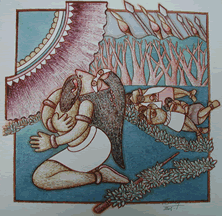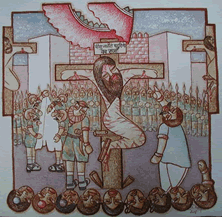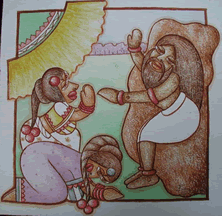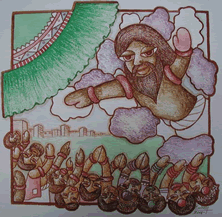|
| |
|

|
|
Stories from the
life of Jesus (page 3) |
|
|
|
|
Jesus
Washes His Disciples' Feet
John 13:1-17
(Scriptural Reference)
While Jesus was on the earth He knew
that He would ultimately have to show His love for mankind through suffering
for the sins of the world. Jesus would often teach His disciples about
what would happen to Him and His love for the people of the world. On
one occasion Jesus gave them a lesson on His love and what it meant
to follow Him. Jesus was celebrating with His disciples a Jewish festival
called the "Passover". (You can read a little about this festival
in story 4.) A part of this festival was an evening meal that you would
share with your family and friends. Jesus was having this meal with
His disciples. At this time Jesus already knew that one of His own disciples
named Judas Iscariot would betray Him to the Jewish religious leaders
and government officials and that He would soon be killed but would
be resurrected and return to God the Father. Knowing all of this Jesus
got up from the meal took off His outer garment and put a wash towel
around His waist. He then poured water into a basin and began to wash
His disciples' feet. The disciples
of course were shocked at what He was doing because this task was done
only by the lowest servant but never by anyone of Jesus' stature. Jesus
even washed the feet of the disciple that would eventually betray Him,
though the other disciples did not know who it was. They were so surprised
by Jesus' action that Peter, one of the disciples at first prevented
Jesus from washing His feet, but later did allow Him. You would probably
be shocked if your boss or supervisor told you that he/she was going
to wash your feet. It would be like your boss or supervisor cleaning
your toilet at your house. When
Jesus finished washing His disciples' feet He sat down and then asked
His disciples if they understood what He had done for them. Jesus then
began to teach them the lesson He wanted them to learn by saying to
them, "You call Me Teacher and Lord, and it is right that you do
that because that is who I am." Jesus said, "No servant is
greater than his master, nor is a messenger greater than the one who
sent him." He went on to tell them that if He their Teacher and
Lord washed their feet; they ought to wash one another's feet. Jesus
was giving them an example to follow. He then told them that they would
be blessed if they did these things.
Questions for
Discussion and Thought:
1. What does Jesus want to teach
us by what He did with His disciples?
(In the world we are taught
that greatness comes from having others serve us, but Jesus shows us
that greatness comes by serving others. Being a follower of Jesus is
serving others.)
2. What does this show us about Jesus?
(This shows us the humbleness
of Jesus. Jesus was the Son of God but He took on the role of a servant
and washed His disciple's feet. This was only an example of the greater
act of servanthood that He would go through when He would die for the
sins of the world. Jesus at another time said that He had come, not
to be "served, but to serve and give His life so that others could
be free from the penalty of sin.")
Comments
or Questions?
|

|
|
|Back
to Top| |
|
Jesus
Prays Before His Arrest
Matthew 26:36-56; Mark 14:32-52; Luke
22:39-53; John 18:1-11
(Scriptural Reference)
As Jesus neared the time when He would
be arrested and killed, He began to feel the strain of the situation.
His heart became sorrowful because of what He was going to face in just
a few hours. Because of this sorrow, He took His disciples to a place
called Gethsemane, which was a garden area near the city of Jerusalem,
so that He could pray. When they
came to Gethsemane, He told some of the disciples to wait. He took three
of them, Peter, James, and John with Him just a little way from the
others and began to share His grief. He told them that He was overwhelmed
with sorrow and that they should stay where they were and keep watch.
Then Jesus went a little further and fell with His face to the ground
and began to pray to His Father. He prayed, "My Father, if it is
possible, take this cup from Me; though not My will, but yours be done."
Because Jesus was expending so much energy in His praying, an angel
from Heaven came to Him and strengthened Him. After this He began to
pray even more and His sweat became like drops of blood falling to the
ground. After He finished praying,
He went back to His disciples and found them sleeping. He told them
again to keep watch and pray. He returned to pray the same thing that
He had prayed earlier. When He came back to His disciples the second
time, they were sleeping again and they did not know what to say to
Him. We could imagine how embarrassed they felt. Jesus went and prayed
a third time, but on returning He found the disciples sleeping again.
This time He told them to get up because the time had come for Him to
be arrested and that the one who was going to betray Him was coming.
As
Jesus was talking, Judas, His disciple, came with soldiers and officials
representing the Jewish religious leaders. They were carrying swords
and clubs. Judas had already made an arrangement with the Jewish leaders
to betray Jesus for thirty silver coins. He also set a signal with them
by saying, "The one I kiss is the man; arrest him." When they
came to Jesus, Judas went to Him and greeted Him with a kiss. Then those
with Judas grabbed Jesus and arrested Him. They took Him to the top
Jewish religious leader. Jesus did not resist or struggle with them
but went willingly because He knew that this was part of God's plan.
Questions for Discussion
and Thought:
1. Why was Jesus so sorrowful?
(Jesus was sorrowful because of the events that would soon take place.
He was going to be betrayed by Judas, one of His own disciples, be arrested,
be deserted by His disciples, and be killed even though He was the Son
of God. But His greatest grief would be that He would suffer for the
sins of all people which meant experiencing separation from God His
Father, the penalty of sin.)
2. What did Jesus mean when He prayed,
"My Father, if it is possible, take this cup from Me; though not
My will, but yours be done"?
(We see the human side of Jesus as He struggles with this difficult
moment when He says, "If it is possible" but we see His great
love when He says, "though not My will, but yours be done".
The phrase "this cup" referred to the events of His suffering
that would soon take place. Because Jesus was human and knew human sorrow
He struggled as any person would. Jesus knew even as He was praying
that there was no way to avoid the suffering because there was no other
person that could be the perfect sacrifice for sin.)
3. What does this teach us about
Jesus?
(He was human as we are and experienced the sorrow and suffering that
we face. When we face sorrow we can come to Jesus to find help because
He understands our grief and sorrow.)
Comments
or Questions?
|

|Back
to Top| |
|
Pilate
Presents Jesus Before the Crowd
Matthew 27:11-26; Mark 15:1-15; Luke 22:66-23:25;
John 18:28-19:16
(Scriptural Reference)
After Jesus appeared before the religious leaders,
the mob brought Him to the Roman Governor named Pilate. The Governor
was like a Chief Minister of a state. The religious leaders began to
falsely accuse Jesus of various crimes like subverting the nation, opposing
the payment of taxes, and claiming to be king. Pilate asked Jesus, "Are
you the King of the Jews?" Jesus responded, "Yes I am."
But with all of the accusations that the religious leaders spoke against
Jesus, He remained silent and did not answer them. Pilate was amazed
that Jesus did not say anything nor respond to a single complaint brought
against Him. After listening to the religious leaders, Pilate told them
that he had found no fault or crime against Jesus, but they insisted
that Jesus be punished and they began to stir up the crowd against Him.
I imagine like in any mob situation, many of the people did not know
what was going on, but were simply drawn into all the excitement. After
some time, Pilate again called the religious leaders, told them that
he found no guilt in Jesus, and that he was going to punish Him and
release Him. But the crowd began to yell, "Take Him away!"
Finally,
Pilate told the crowd that even though he found no fault in Jesus he
would release one prisoner, as was his custom. During the Festival he
normally released one man who had been in prison and the people could
choose who it would be. At this time, there was a notorious prisoner
named Barabbas, who had murdered some people during a rebellion, so
Pilate offered to release either this man or Jesus. Pilate said to the
crowd, "Whom do you want me to release, Barabbas or Jesus, the
King of the Jews?" The religious leaders again moved the mob to
ask for the release of Barabbas. And Pilate asked, "And what should
I do with Jesus whom you call the King of the Jews?" The people
shouted back, "Kill Him!" But Pilate responded, "Why?
What evil or crime has He done?" But the people shouted even more,
"Kill Him." Pilate then saw that he could not control the
mob because a riot was starting and he wanted to satisfy the crowd,
so he released Barabbas; and after having Jesus whipped, he delivered
Him to be crucified.So Pilate showed his
weakness in giving in to the wishes of the mob even though he knew that
Jesus was innocent. The crowd chose a murderer instead of the Son of
God. All of this happened because of God's plan.
Questions for Discussion
and Thought:
1. Why would Jesus not answer any of the accusations
that were brought against Him?
(He knew that none of them were true, but that He had to suffer for
the wrongs of others even though He was sinless.)
2. Would you have joined the crowd if you
had been in this situation?
3. What do we learn about Jesus in this story?
(We see Jesus' great love for all people as He showed His willingness
to suffer even though He was innocent.)
Comments
or Questions?
|

|Back
to Top| |
|
Jesus
is Crucified
Matthew 27:27-66; Mark 15:16-47; Luke
23:26-55; John 19:17-42 (Scriptural Reference)
After Pilate gave in to the crowd's
demands, he handed Jesus, an innocent man, over to the soldiers who
took Him to their headquarters. While there, they stripped Him and put
a purple robe on Him and made a crown out of thorns and put it on His
head as if it were a king's crown. They gave Him a staff pretending
that it was a king's scepter. They bowed before
Him mocking Him saying, "Hail, King of the Jews." They began
to spit on Him and hit him with their fists. They took the staff away
from Jesus and began to beat Him in the head with it. After they finished
mocking Him, they took Him away to a place called Golgotha, which means
"the place of the Skull" and there they crucified Him. This
was simply their job as Roman soldiers. Crucifying
criminals was a common practice during Roman times and was considered
the cruelest form of punishment. The normal procedure for crucifixions
was that first the criminal would have to carry the cross which he would
be crucified on through the crowded streets, facing the jeers of the
people. The criminal would carry the cross to the place where he would
be executed, and there he would be publicly humiliated by being stripped
naked. The cross was made of two wooden beams that were placed in the
shape of a "+". Having reached the place for the crucifixion,
he would be laid on his back on the ground while he was either tied
or nailed to the cross. Jesus was nailed to the cross. Jesus' hands
were nailed to the horizontal beam and His feet to the vertical beam.
The cross would have then been lifted up with the criminal on it and
dropped into a hole that was dug in the ground. There the criminal would
hang exposed to the physical pain, public ridicule, daytime heat and
nighttime cold. The torture could last for days until death. At
9:00 in the morning the soldiers put Jesus on the cross, along with
two criminals who were placed on crosses on either side of Him. While
on the cross, people would come by insulting Jesus saying, "Come
down from the cross if you are the Son of God" and "He saved
others but He cannot save Himself." Even one of the criminals was
insulting Him. The soldiers divided up His clothes among themselves.
But Jesus prayed, "Father forgive them because they do not know
what they are doing." At noon the sun was blocked so that it became
dark as though it were night, and it lasted until 3:00 in the afternoon.
At about this time Jesus said, "It is finished", His head
fell forward, and then He died. For
three years Jesus had been telling His disciples that He would have
to suffer much and be put to death. All that He had told them now had
come true. But there was still one more great event that He had told
them would occur that was still to happen.
Questions for
Discussion and Thought:
1. How could Jesus ask the Father
to forgive these people even though they were carrying out this cruel
punishment on Him?
(This shows Jesus' great love for all mankind and the unbelievable forgiveness
of God. He also knew this was part of God's plan)
2. Could Jesus have saved Himself?
(Yes! All that Jesus was going through was part of God's plan and
was happening only because He allowed it. It was wicked people who put
Jesus to death but it was by divine design that it happened. Jesus had
the authority and right to stop the whole event but because of His love
for all, He chose to suffer.)
3. What did Jesus mean when He said,
"It is finished"?
(The perfect sacrifice for the sins of mankind had been paid and now
there was a way to find forgiveness of sins and to have peace with God.)
4. Do you believe that Jesus died
for you and your sins?
Comments
or Questions?
|

|Back
to Top| |
|
Matthew 28:1-15; Mark 16:1-20; Luke
24:1-49; John 20:1-18
(Scriptural Reference)
After Jesus died, one of His disciples,
a rich man, came to Pilate the Governor to ask if he could take Jesus'
body in order to give it the proper Jewish burial. Pilate was surprised
that He had died so soon, so he sent one of his soldiers to investigate.
The soldier returned to inform Pilate that Jesus had died. Therefore
Pilate gave permission for Jesus' body to be taken down and given to
the man. The man took Jesus' body and placed Him in his own tomb. (A
tomb was simply a small cave-like structure dug into the rock that would
be used for the burial of the dead.) After they placed His body in the
tomb they rolled a large stone in front of the tomb. This took place
on what we would call Friday. On
Sunday morning after Jesus had died and been buried, several women prepared
spices to put on Jesus' body as part of the Jewish burial custom. As
they were walking to the tomb where Jesus was buried, they wondered
among themselves who would take away the huge stone in front of the
tomb. But when they arrived the stone had already been taken away. They
did not know that an angel had come down from Heaven and an earthquake
had occurred that caused the stone to roll away. When they got to the
tomb an angel appeared to them and told them not to be afraid because
he knew that they where looking for Jesus. The angel showed them the
place where Jesus had been buried and told them that He was not there
but had risen from the dead. The angel reminded them about what Jesus
had said concerning His arrest, crucifixion, and death. But that He
had said He would rise from the dead third day. The ladies remembered
His words. The angel then told them to go quickly and tell the other
disciples that Jesus had risen and that He would come to them. The
ladies, half afraid and half joyful, ran back to look for the disciples
to tell them the good news. But when they told the news, some of the
disciples did not believe that it had actually happened. Some thought
it was nonsense and others said that they would have to see Him before
they believed. That Sunday morning
Jesus first appeared to a woman named Mary Magdalene who had been a
follower of Jesus. She first thought that Jesus was only the caretaker
of the tombs but then saw that it was Jesus. That evening He appeared
to a group of disciples who were together in someone's house. He showed
them His hands and feet where the nails had been hammered. But the disciples
were frightened because they thought they were seeing a spirit or ghost.
Jesus asked them, "Why are you afraid and why are you doubting?"
Then He said, "Look at My hands and feet and touch them because
a spirit or ghost does not have flesh and bones." And because they
still had a few doubts, He asked for something to eat to show them that
it was really Him. He then began to help them understand that what had
happened was according to what He had taught them and according to what
the Holy Scriptures had foretold; that the Savior King, Jesus, would
have to suffer and rise from the dead the third day. After
His resurrection, Jesus made several more appearances to different disciples
over a forty-day period. Can you imagine the joy and astonishment the
followers of Jesus felt?
Questions for
discussion and thought:
1. If you had been one of the ladies
that first went to the tomb where Jesus had been buried, what would
your reaction have been? Would it have been hard for you to believe
that Jesus had risen from the dead?
2. Why did Jesus want to show the disciples that He had really risen
from the dead and that He was not just a ghost?
(He wanted to show them that the resurrection had been a bodily resurrection
and not just His spirit.)
3. What is the significance of Jesus'
resurrection?
(Jesus conquered both sin
and death and now through believing on Jesus a person can have eternal
life.)
4. What hope does His death and resurrection give us?
(Through Jesus' death and resurrection the perfect sacrifice has been
offered for our sins. There is no need for any more sacrifice. The way
to have forgiveness of sins and peace with God has been made through
Jesus' death and resurrection. Through Jesus there is hope.)
Comments
or Questions?
|

|Back
to Top| |
|
Jesus
Ascends
Luke
24:50-53; Acts 1:1-11
(Scriptural Reference)
The
disciples of Jesus had been following Him for about three years when
their hopes were momentarily dashed by His death. Then, unbelievingly,
He was resurrected from the dead. Though He had told them what would
happen, some did not believe when they first heard the news. Jesus,
wanting to show the disciples that what He had said was from God, showed
Himself to various people over a forty-day period after His
resurrection.
On the
last occasion that Jesus was with His followers, He taught them and
helped them to understand what had happened and how the Holy Scriptures
had foretold its occurrence. He also commanded them to go all over the
world and tell people about Him.
After
He had taught them, He led them to a city called Bethany and He lifted
up His hands and began to bless them. And as He was blessing them, while
the disciples were watching He was taken up into the sky until He went
out of sight. As they continued looking up in the sky two angels in
white clothing appeared to them and said, "Why are you still
looking up in the sky? Jesus, who has gone up to Heaven will come back
to earth in the same way as you have watched Him go into Heaven."
The
disciples then returned to Jerusalem with great joy and were continually
in the Jewish temple praising God..
Jesus
had come to this earth in order to suffer for the sins of all people. He
lived on the earth for about 33 years teaching, performing miracles, and
serving the people. He knew that His life would end with much suffering
and a cruel death, but He came because of His great love. He also knew
that He would conquer death and the grave so that all who believed in
Him could be free. He came to suffer, but as the angels told the
disciples, one day He will return-this time as King and Lord, and He
will bring all things to an end. We do not know when Jesus is coming
again, but we have His promise that He will. When He returns He will
receive all those who have believed in Him.
The
Bible speaks of Jesus coming again:
"So
Jesus was sacrificed once to take away the sins of many people; and he
will appear a second time, not to bear sin, but to bring salvation to
those who are waiting for him."
Jesus
said, "Do not let your hearts be troubled. Trust in God; trust also
in me. In my Father's house are many rooms; if it were not so, I would
have told you. I am going there to prepare a place for you, I will come
back and take you to be with me that you also may be where I am."
"I
saw heaven standing open and there before me was a white horse, whose
rider is called Faithful and True…On his robe and on his thigh he has
this name written: King of Kings and Lord of Lords." This rider is
Jesus, the Savior King.
Questions for
Discussion and Thought:
1.
Did you know that Jesus is coming again?
2.
How can you be ready for His coming?
Comments
or Questions?
|

|Back
to Top| |
|
Life of
Jesus: Page 1 |
2 | 3 |
|